- Home
- Michael Grant
Fear: A Gone Novel Page 2
Fear: A Gone Novel Read online
Page 2
With her berries safely tucked away in her backpack Astrid headed back toward her camp.
Camp was two tents: one—buff colored—she slept in, and one—green with tan lining—she used for storage of nonfood items scavenged from the various campgrounds, ranger offices, and trash heaps in the Stefano Rey.
Once home Astrid unloaded her berries and the rest of the food she’d brought with her into a red-and-white plastic cooler. She’d dug a hole right up against the barrier, and the cooler fit perfectly into that hole.
She’d learned many things in the four months since she had left everyone and everything behind and gone off into the woods. One thing she had learned was that animals avoided the barrier. Even the insects stayed a few feet back. So storing her food right up against that eye-tricking, pearly gray wall kept her food supply safe.
It also helped to keep her safe. Camping here, this close to the barrier, and right at the cliff’s edge, meant there were fewer ways a predator could come at her.
She had strung a wire in a perimeter around the camp. The wire was hung with bottles containing marbles, and rusty cans. Anything that hit the wire would make a racket.
She couldn’t say she felt safe. A world where Drake was presumably still alive would never be safe. But she felt as safe here as anywhere in the FAYZ.
Astrid flopped into her nylon sling chair, propped her weary feet up on a second chair, and opened a book. Life now was an almost constant search for food, and without any lamp she had only an hour of light at sunset to read.
It was a beautiful location atop a sheer bluff by the ocean. But she turned to the setting sun to catch the red rays on the page of her book.
The book was Heart of Darkness.
I tried to break the spell—the heavy, mute spell of the wilderness—that seemed to draw him to its pitiless breast by the awakening of forgotten and brutal instincts, by the memory of gratified and monstrous passions. This alone, I was convinced, had driven him out to the edge of the forest, to the bush, towards the gleam of fires, the throb of drums, the drone of weird incantations; this alone had beguiled his unlawful soul beyond the bounds of permitted aspirations.
Astrid looked up at the trees. Her camp was in a small clearing, but the trees pressed close on two sides. They weren’t as towering here close to the shore as they were farther inland. These seemed friendlier trees than the ones deeper into the forest.
“‘The heavy, mute spell of the wilderness,’” Astrid read aloud.
For her the spell was about forgetfulness. The harsh life she now lived was less harsh than the reality she had left behind in Perdido Beach. That was the true wilderness. But there she had awakened forgotten and brutal instincts.
Here it was only nature trying to starve her, break her bones, cut and poison her. Nature was relentless but it was free of malice. Nature did not hate her.
It was not nature that had driven her to sacrifice her brother’s life.
Astrid closed her eyes and then the book and tried to calm the rush of emotion inside her. Guilt was a fascinating thing: it seemed not to weaken over time. If anything it grew stronger as the circumstances faded from memory, as the fear and the necessity became abstract. And only her own actions stood out with crystal clarity.
She had hurled her sick, strange little brother to the huge, appalling creatures that threatened her and threatened every human in the FAYZ.
Her brother had disappeared.
So had the creatures.
The sacrifice had worked.
Then God said, “Take your son, your only son, Isaac,
whom you love, and go to the region of Moriah.
Sacrifice him there as a burnt offering on one
of the mountains I will tell you about.”
Only no loving God, seeing her faith, had intervened to stop the killing.
For the excellent reason that there was no loving God.
That it had taken her so long to realize this was an embarrassment to her. She was Astrid the Genius, after all. The name she had carried for years. And yet Sam, with his shoulder-shrugging indifference to all matters religious, had been so much closer to the truth.
What kind of a fool looked at the world as it was—and this terrible world of the FAYZ especially—and believed in God? A God actually paying attention, let alone caring about his creations?
She had murdered Little Pete.
Murdered. She didn’t want to dress it up with any nice word. She wanted it harsh. She wanted the word to be sandpaper dragged across her raw conscience. She wanted to use that awful word to obliterate whatever was left of Astrid the Genius.
It was a good thing to have decided there was no God, because if there were then she would be damned to eternal hell.
Astrid’s hands shook. She laid the book flat on her lap. From her backpack she retrieved the bag of pot. She rationalized the drug on the grounds that it was the only way she could fall asleep. If this were the normal world, she might have a prescription for a sleeping pill. And that wouldn’t be wrong, would it?
Well, she needed to sleep. Hunting and fishing were early morning activities and she needed to sleep.
She flicked the lighter and brought it to the bowl of the pipe. Two hits: that was her rule. Just two.
Then she hesitated. A memory twinge. Something nagging at her consciousness, warning her that she had seen something important and missed it.
Astrid frowned, tracing back her actions. She set aside the pot and the book and walked back to her buried pantry. She hauled up the cooler. It was too dark to see into the hole, so she made the decision to use a few precious seconds of battery life and flicked on a small flashlight.
She knelt down, and yes, there it was. Three sides of the hole were dirt; the fourth was the barrier. Nothing ever stuck to the barrier—nothing. And yet, a few small clumps of dirt now did exactly that.
Astrid drew her knife and poked at the dirt, which fell away.
Was it her imagination? The barrier down in the hole looked different. It no longer seemed to glow softly. It was darker. The illusion of translucency was gone. Now it seemed opaque. Black.
She drew the sharp point of her knife along the barrier, from above the hole down.
It was subtle, almost imperceptible. But the knifepoint glided with no resistance whatsoever until it reached the darker color and then the point dragged. Not much. Not much at all. Just as if it had gone from polished glass to burnished steel.
She flicked off the light and took a deep, shaky breath.
The barrier was changing.
Astrid closed her eyes and stood there for a long moment, swaying slightly.
She put the cooler back into the hole. She would have to await sunrise to see more. But she already knew what she had seen. The beginning of the endgame. And she still didn’t know what the game was.
Astrid lit the pipe, took a deep lungful, then, after a few minutes, another. She felt her emotions go fuzzy and indistinct. The guilt faded. And within half an hour sleep drew her to her tent, where she crawled into her sleeping bag and lay with her arms curled around the shotgun.
Astrid giggled. So, she thought, she wouldn’t have to go to hell. Hell was coming to her.
When that final night came the demon Drake would find her.
She would run. But never fast enough.
TWO
64 HOURS, 57 MINUTES
“PATRICK, YOUR GENIUS is showing!” Terry cried in a high falsetto voice.
“It iiiiis?” Philip asked in a low, very dumb voice. He covered himself with his hands and a wave of laughter rose from the assembled audience.
It was Friday Fun Fest at Lake Tramonto. Every Friday the kids rewarded themselves with an evening of entertainment. In this case, Terry and Philip were doing a re-creation of a SpongeBob episode. Terry had a yellow T-shirt painted with spongelike holes, and Phil wore an arguably pink T-shirt for the role of Patrick Star.
The “stage” was the top deck of a big houseboat that had been
shoved out into the water so that it wallowed a few dozen feet off the dock. Becca, who played Sandy Cheeks, and Darryl, who did a very good Squidward, were in the cabin below waiting for their cues.
Sam Temple watched from the marina office, a narrow, two-story, gray-sided tower that afforded him a clear view over the heads of the crowd below. Normally the houseboat was his, but not when there was a show to put on.
The crowd in question was 103 kids, ranging from one year old to fifteen. But, he thought ruefully, no audience of kids had ever looked quite like this.
No one over the age of five went unarmed. There were knives, machetes, baseball bats, sticks with big spikes driven through them, chains, and guns.
No one was fashionably dressed. At least, not by any of the normal standards. Kids wore disintegrating shirts and jeans in sizes way too large. Some wore ponchos made of blankets. Many went barefoot. Some had decorated themselves with feathers stuck in their hair, big diamond rings made to fit with tape, painted faces, plastic flowers, all manner of bandannas, ties, and crisscross belts.
But they were clean, at least. Much cleaner than they’d been back in Perdido Beach almost a year ago. The move to Lake Tramonto had given them a seemingly endless supply of freshwater. Soap was long gone, as was detergent, but freshwater did wonders all by itself. It was possible to be in a group of kids now without gagging on the stink.
Here and there as the sun sank and the shadows grew Sam could make out the flare of cigarette butts. And despite all they’d tried to do there were still bottles of booze—either original or moonshine—being passed around the small gaggles of kids. And probably, if he’d bothered, he could have caught a whiff of marijuana.
But mostly things were better. Between the food they raised and the fish they caught in the lake and the food they traded for from Perdido Beach, no one was starving. This was an accomplishment of epic proportion.
And then there was the Sinder project, which had amazing potential.
So why did he have this itchy feeling that something was wrong? And more than just a feeling. It was like something half-seen. Less than that. Like a feeling that there was something he should have seen, would have seen if he just turned around quickly enough.
It was like that. Like something that stood just outside the range of his peripheral vision. When he turned to look it was still in his peripheral vision.
It was looking at him.
It was doing it right now.
“Paranoia,” Sam muttered. “You’re going slowly nuts, dude. Or maybe not so slowly, since you’re talking to yourself.”
He sighed and shook his head and formed a grin he hoped would spread from without to within. He just wasn’t used to so much … peace. Four months of it. Good grief.
Sam heard footsteps on the rickety stairs. The door opened. He glanced back.
“Diana,” he said. He stood up and offered her his chair.
“Really not necessary,” Diana said. “I’m pregnant, not crippled.” But she took the chair anyway.
“How are you doing?”
“My boobs are swollen and they hurt,” she said. She cocked her head sideways and looked at him with a degree of affection. “Really? That makes you blush?”
“I’m not blushing. It’s…” He couldn’t really think of what else it might be.
“Well, then, I’ll spare you some of the more disturbing things going on with my body right now. On the good side I no longer throw up every morning.”
“Yes. That is good,” Sam said.
“On the downside, I have to pee more or less all the time.”
“Ah.” This conversation was definitely making him uncomfortable. In fact, even looking at Diana made him uncomfortable. She had a definite, noticeable bulge beneath her T-shirt. And yet she was no less beautiful than she’d ever been and still had the same knowing, challenging smirk.
“Shall we discuss the darkening of areolae?” she teased.
“Please, I’m begging you: no.”
“The thing is, it’s early for some of this,” Diana said. She tried to make it sound casual. But she failed.
“Uh-huh.”
“I shouldn’t be this big. I have all the books on pregnancy, and they all say I shouldn’t be this big. Not at four months.”
“You look okay,” Sam said with a certain desperate edge in his voice. “I mean good. You look good. Better than good. I mean, you know, beautiful.”
“Seriously? You’re hitting on me?”
“No!” Sam cried. “No. No, no, no. No. Not that…” He let that trail off and bit his lip.
Diana laughed delightedly. “You are so easy to mess with.” Then she grew serious. “Have you ever heard of the quickening?”
“Like for taxes?”
“No. No, Sam, that would be Quicken. The quickening is when the fetus starts to move.”
“Oh. Yeah. That.”
“Give me your hand,” Diana said.
He was absolutely sure he did not want to give her his hand. He had a terrible premonition what she would do with his hand. But he could not think of a way to refuse.
Diana looked at him with an innocent expression. “Come on, Sam, you’re the one who can always find a way out of a life-or-death crisis. Can’t you think of a way to refuse?”
That forced a smile from him. “I was trying. Brain freeze.”
“Okay, then, give me your hand.”
He did and she placed his palm against her belly.
“Yep, that’s a, um, a definite belly,” he said.
“Yeah, I was hoping you’d agree that that is a belly. I needed a second opinion. Just wait… There!”
He had felt it. A small movement in her tight-stretched bulge.
He made a sickly smile and withdrew his hand. “So, quickening, huh?”
“Yes,” Diana said, no longer kidding. “More than that, really. I would call it a kick. And guess what? It started about three weeks ago, which would be my thirteenth week. Now, you might think, pfff, no big deal. But here’s the thing, Sam: human babies all grow at basically the same rate. It’s clockwork. And human babies do not start kicking at thirteen weeks.”
Sam hesitated, not sure if he should acknowledge the use of that word, “human.” Whatever Diana feared or suspected or even was just imagining, he didn’t want it to be his problem.
He had plenty of problems already. Distant problems: down on a deserted stretch of beach there was a container-load of shoulder-fired missiles. As far as he knew, his brother, Caine, had not found them. If Sam tried to move them and Caine found out, it would likely start a war with Perdido Beach.
And Sam had problems nearer to his heart: Brianna had discovered Astrid’s haunt in the Stefano Rey. Sam had known Astrid was still alive. He’d had reports of her staying near the power plant for a few days after the great bug battle and the Big Split that had separated the kids of the FAYZ into Perdido Beach and Lake Tramonto groups.
He’d also learned that she had slept for a while in an overturned Winnebago on a back road in the farm country. He had waited patiently for her to come back. But she never had, and then he’d heard nothing about her for the last three months.
Now, just yesterday morning, Brianna had located her. Brianna’s super-speed made her an effective searcher on roads, but it had taken her longer to thread her way through the forest; it was not a good idea to trip over a tree root at seventy miles an hour.
Of course, searching for Astrid was not Brianna’s main mission. Her main mission was to find the Drake-Brittney creature. Nothing had been seen or heard of Drake, but no one believed he was dead. Not truly dead.
Sam came reluctantly back to the problem of Diana. “What’s your reading on the baby?”
“The baby is a three bar,” Diana said. “The first time I read? Two bar. So, still growing.”
Sam was shocked. “Three bar?”
“Yes, Sam. He, she, or it is a mutant. A powerful one. Growing more powerful.”
“Have you told anyon
e else?”
Diana shook her head. “I’m not stupid, Sam. Caine would come after it if he knew. He would kill us both if he had to.”
“His own child?” Sam had a hard time believing that even Caine would be that depraved.
“Maybe not,” Diana said. “He made it very clear when I told him that he wanted nothing to do with it. I would say the idea sickened him. But a powerful mutant? Very different story. He might just take us. Caine might want to control the baby, or he might want to kill it, but for him there’s no third choice. Anything else would be…” She searched his face as if the right word might be written there. “Humiliating.”
Sam felt his stomach churning. They’d had four months of peace. In that time Sam, Edilio, and Dekka had taken on the job of setting up a sort of half-aquatic town. Well, mostly Edilio. They had parceled out the houseboats, sailboats, motorboats, campers, and tents. They’d arranged for a septic tank to be dug, well away from the lake to avoid disease. Just to be safe they had set up a system of hauling water from halfway down the shore to the east in what they called the lowlands, and forbidden anyone to drink the water where they bathed and swam.
It had been amazing to watch the quiet authority Edilio brought to the job. Sam was nominally in charge, but it never would have occurred to Sam to worry so much about sanitation.
The fishing boats, with crews trained by Quinn down in Perdido Beach, still brought in a decent haul every day. They had planted carrots, tomatoes, and squash in the low patch up by the barrier, and under Sinder’s care they were growing very nicely.
They had locked up their precious stash of Nutella, Cup-a-Noodles, and Pepsi, using those as currency to buy additional fish, clams, and mussels from Perdido Beach, where Quinn’s crews still fished.
They also had negotiated control over some of the farmlands, so artichokes, cabbage, and the occasional melon could still be had.
In truth Albert managed all the trade between the lake and PB, as they called it, but the day-to-day management of the lake was up to Sam. Which meant Edilio.
Almost from the beginning of the FAYZ, Sam had lived with fantasies of a sort of personal judgment day. He pictured himself standing before judges who would peer down at him and demand he justify every single thing he had done.

 Fear
Fear Plague
Plague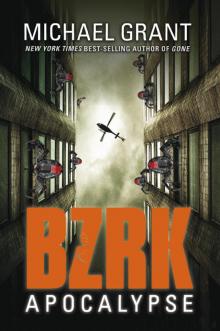 BZRK: Apocalypse
BZRK: Apocalypse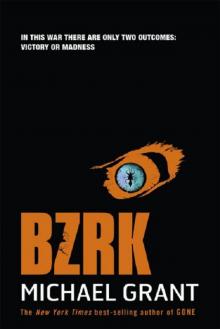 Bzrk
Bzrk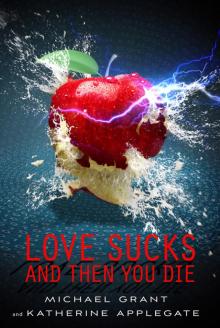 Love Sucks and Then You Die
Love Sucks and Then You Die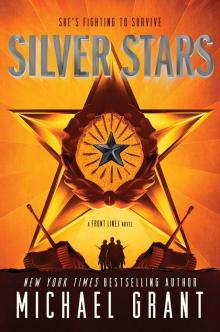 Silver Stars
Silver Stars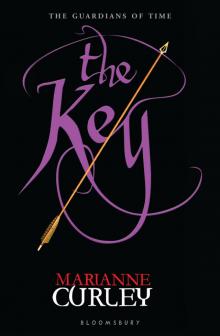 The Key
The Key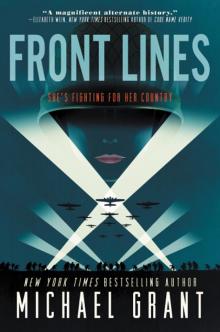 Front Lines
Front Lines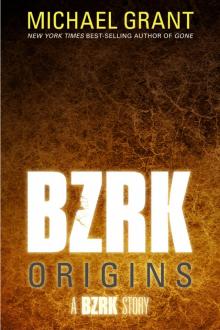 BZRK Origins
BZRK Origins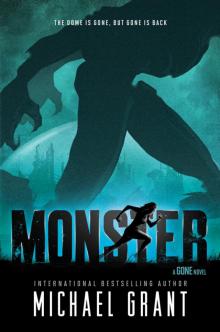 Monster
Monster Gone
Gone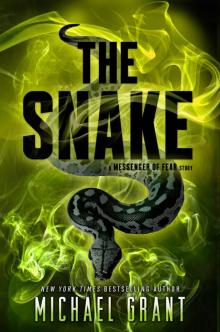 The Snake
The Snake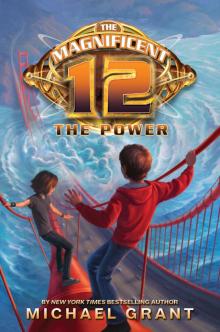 The Power
The Power Hunger
Hunger Lies
Lies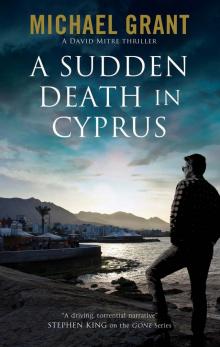 A Sudden Death in Cyprus
A Sudden Death in Cyprus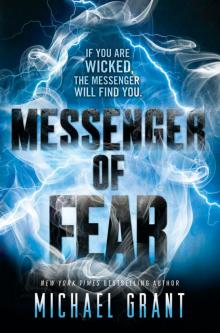 Messenger of Fear
Messenger of Fear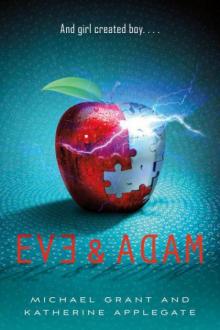 Eve & Adam
Eve & Adam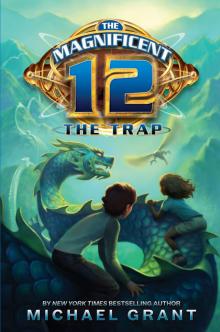 The Trap
The Trap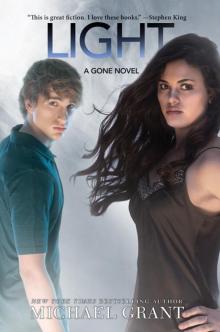 Light
Light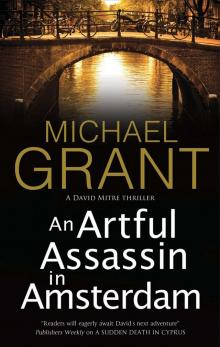 An Artful Assassin in Amsterdam
An Artful Assassin in Amsterdam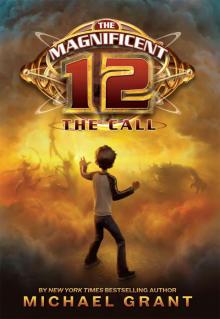 The Call
The Call Hero
Hero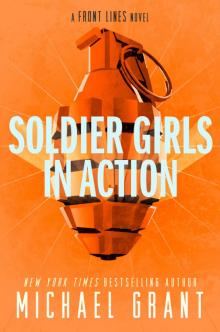 Soldier Girls in Action
Soldier Girls in Action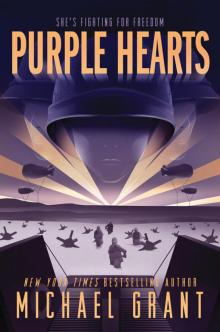 Purple Hearts
Purple Hearts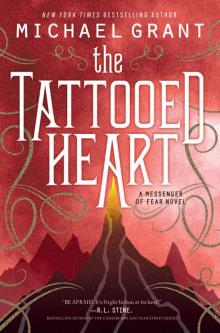 The Tattooed Heart
The Tattooed Heart The Fall of the Roman Empire
The Fall of the Roman Empire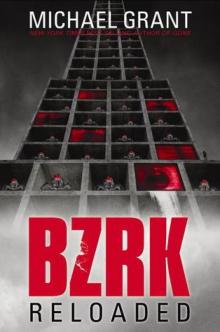 BZRK Reloaded
BZRK Reloaded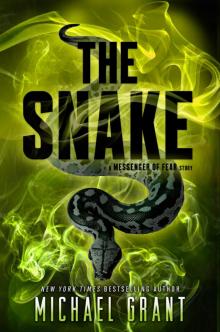 Messenger of Fear Novella #1
Messenger of Fear Novella #1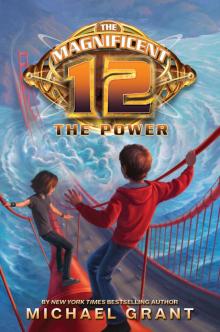 The Magnificent 12
The Magnificent 12 Fear: A Gone Novel
Fear: A Gone Novel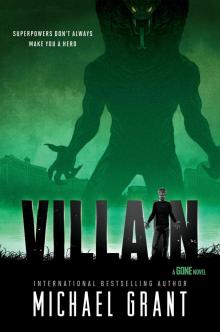 Villain
Villain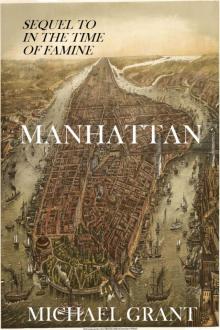 Manhattan
Manhattan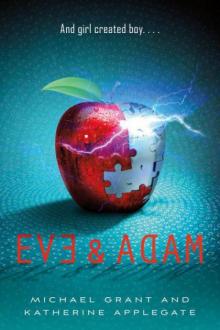 Eve and Adam
Eve and Adam Plague: A Gone Novel
Plague: A Gone Novel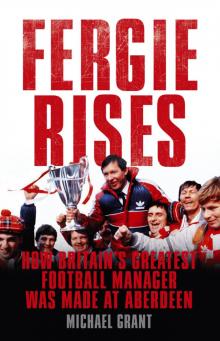 Fergie Rises
Fergie Rises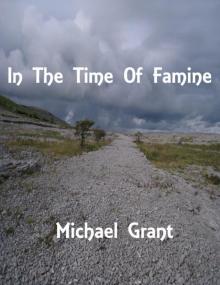 In the Time of Famine
In the Time of Famine Hunger_A Gone Novel
Hunger_A Gone Novel Lies g-3
Lies g-3